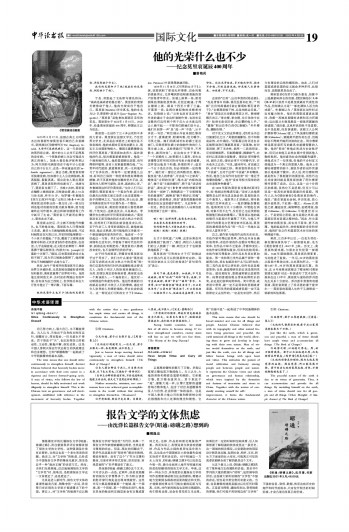自强不息/zìqiánɡ-bùxī/Strive Continuously to Strengthen Oneself
自己努力向上,强大自己,永不懈怠停息。古人认为,天体出于自身的本性而运行,刚健有力,周而复始,一往无前永不停息。君子取法于“天”,也应发挥自己的能动性、主动性,勤勉不懈,奋发进取。这是中国人参照天体运行状态树立的执政理念和自身理想。它和“厚德载物”一起构成了中华民族精神的基本品格。
Theterm means that one should strive continuously to strengthen himself. Ancient Chinese believed that heavenly bodies move in accordance with their own nature in a vigorous and forever forward-going cycle.A man of virtue, who follows the law of heaven, should be fully motivated and work diligently to strengthen himself. This is the Chinese view on governance and self devel⁃opment, established with reference to the movement of heavenly bodies. Together
with the notion that a true gentleman has ample virtue and carries all things, it constitutes the fundamental trait of the Chinese nation.
引例 Citations:
◎天行健,君子以自强不息。(《周易·象上》)
(天的运行刚健有力,一往无前,君子应像天一样,奋发图强,永不停息。)
Just as heaven keeps moving forward vigorously, a man of virtue should strive continuously to strengthen himself. (The Book of Changes)
◎自人君公卿至于庶人,不自强而功成者,天下未之有也。(《淮南子·修务训》)
(自帝王公卿到普通百姓,不奋发进取就能建立功业的,普天之下没有这样的事情。)
Neither monarchs, ministers, nor com⁃moners have ever achieved great accomplish⁃ments in the world without first striving to strengthen themselves. (Huainanzi)
◎外有敌国,则其计先自强。自强者,
人畏我,我不畏人。(《宋史·董槐传》)
(外有敌对的国家,那我们首先要谋求使自己强大。如果自己强大了,敌国就会畏惧我们,我们就不会畏惧他们。)
Facing hostile countries,we must first of all strive to become strong. If we have strengthened ourselves, enemy states will fear us and we will not fear them.(The History ofthe Song Dynasty)
厚德载物/hòudé-zàiwù/Have Ample Virtue and Carry All Things
以宽厚的德性承载天下万物。多指以宽厚之德包容万物或他人。古人认为,大地的形势和特质是宽厚和顺的。它承载万物,使万物各遂其生。君子取法于“地”,要像大地一样,以博大宽厚的道德容纳万物和他人,包含了对自身道德修养及人与自然、社会和谐一体的追求。这是中国人参照大地山川状貌和特质树立的治国理政和为人处事的理念和理想。它
和“自强不息”一起构成了中华民族精神的基本品格。
Thisterm means that one should be broad-minded and care for all things and people. Ancient Chinese believed that with its topography and other natural fea⁃tures being generous and peaceful, the earth sustained all things in the world, allow⁃ing them to grow and develop in keep⁃ing with their own nature. Men of vir⁃tue model themselves on the earth, and just like the earth, care for all things and fellow human beings with open heart and virtue. This embodies the pursuit of moral cultivation and harmony among people and between people and nature.It represents the Chinese views and ideals on governance and human relationship,which were inspired by the formation and features of mountains and rivers in China. Together with the notion of con⁃stantly exerting oneself for self-improvement, it forms the fundamental character of the Chinese nation.
引例 Citations:
◎地势坤,君子以厚德载物。(《周易·象上》)
(大地的气势厚实和顺,君子应以宽厚美德容载天下万物。)
Just like the earth, which is gener⁃ous and peaceful, a man of virtue should have ample virtue and accommodate all things. (The Book of Changes)
◎地势之顺,以地德之厚也。厚,故万物皆载焉。君子以之法地德之厚,而民物皆在所载矣。(陈梦雷《周易浅述》卷一)
(大地的形势是和顺的,因为大地具有宽厚的品德。因其宽厚,所以能承载万物。君子效法大地的宽厚品德,百姓、万物就都能被包容了。)
The peaceful nature of the earth is due to its virtue of generosity. Thus, it can accommodate and provide for all things. By modeling himself on the earth,a man of virtue should care for all peo⁃ple and all things. (Chen Menglei: A Sim⁃ple Account of The Book of Changes)



 上一版
上一版


 缩小
缩小 全文复制
全文复制 上一篇
上一篇